Sir John Monash, Personal Files Book 2, 23 February - 31 March 1915, Part 2
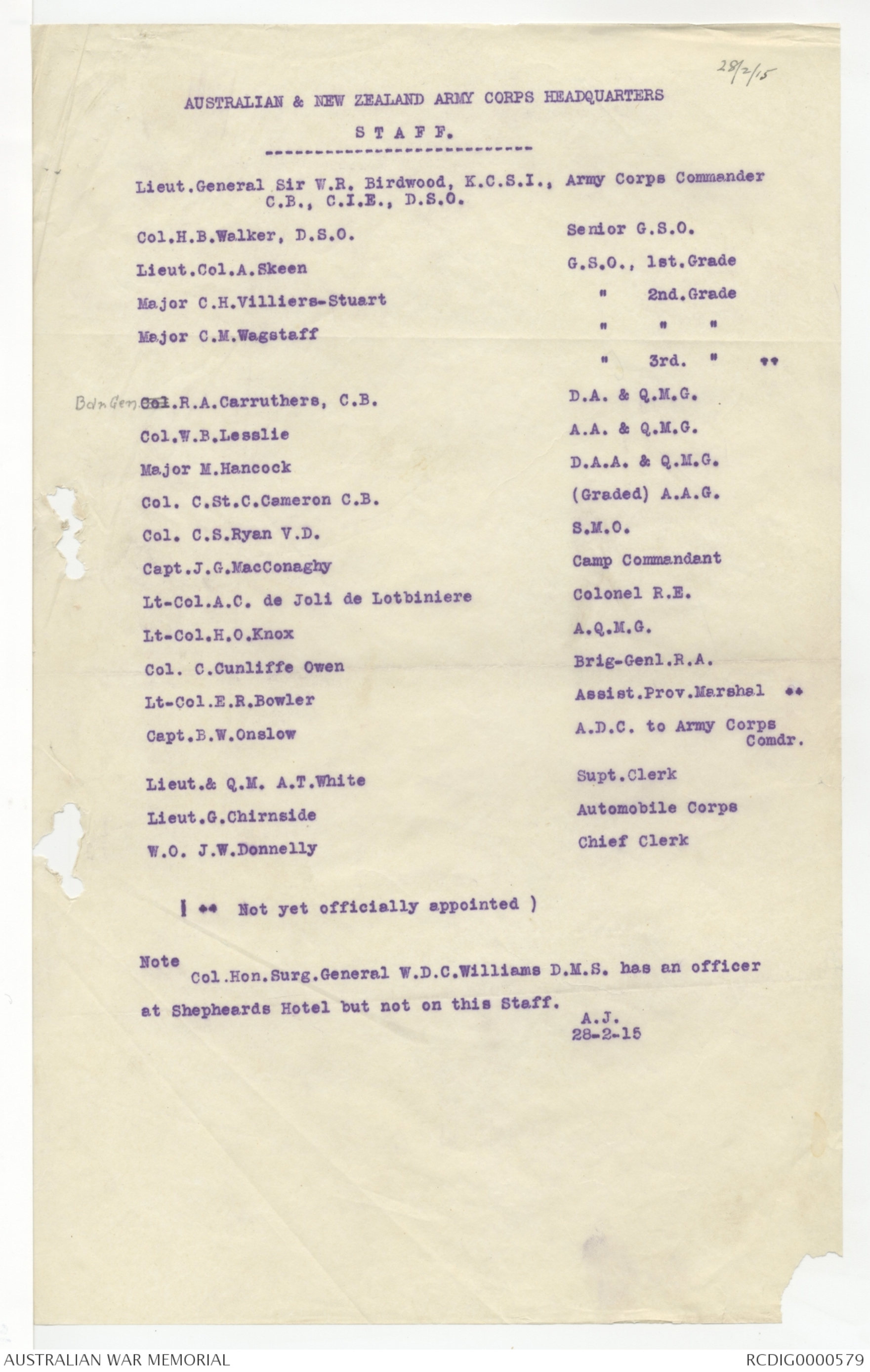
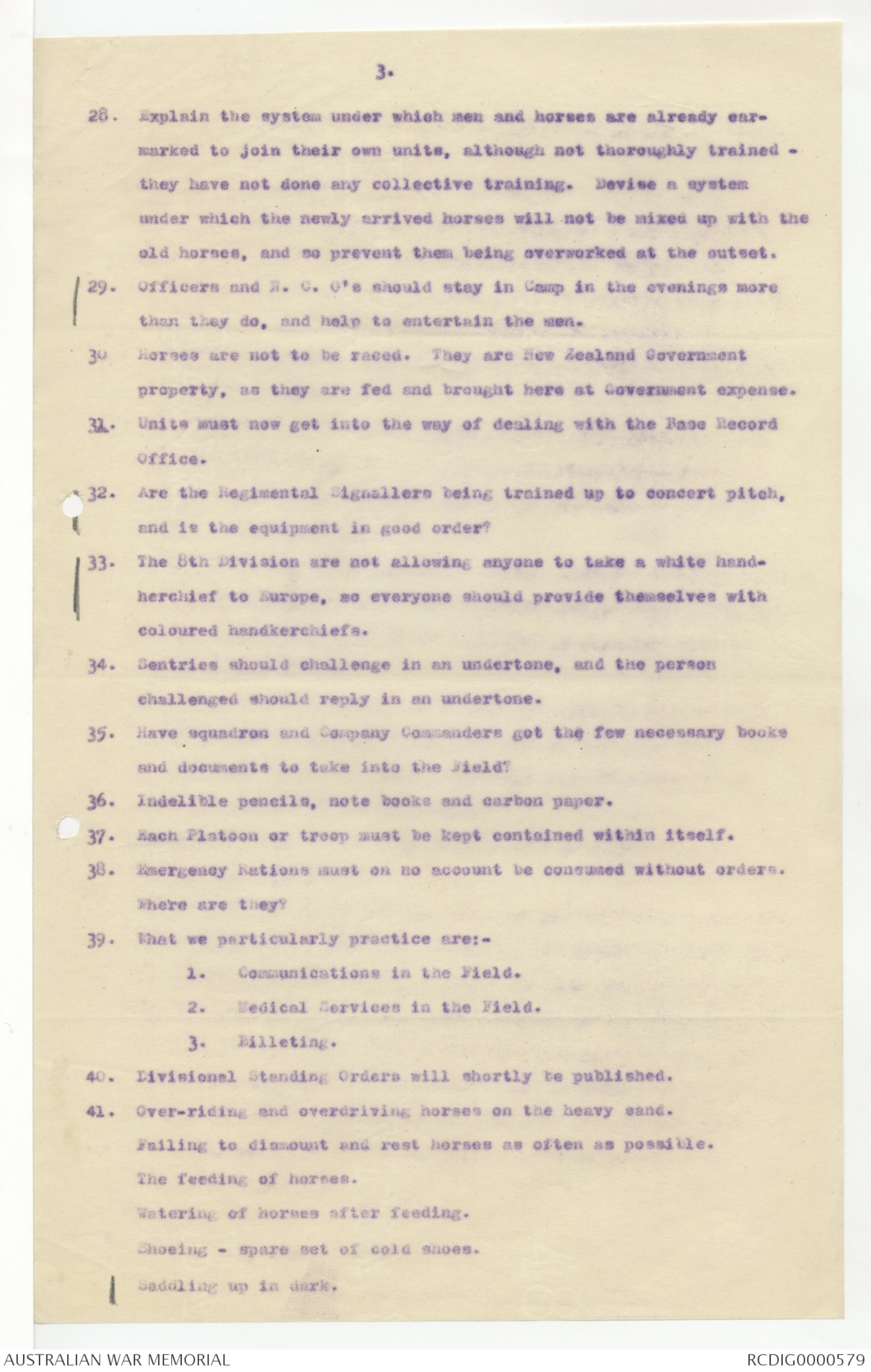
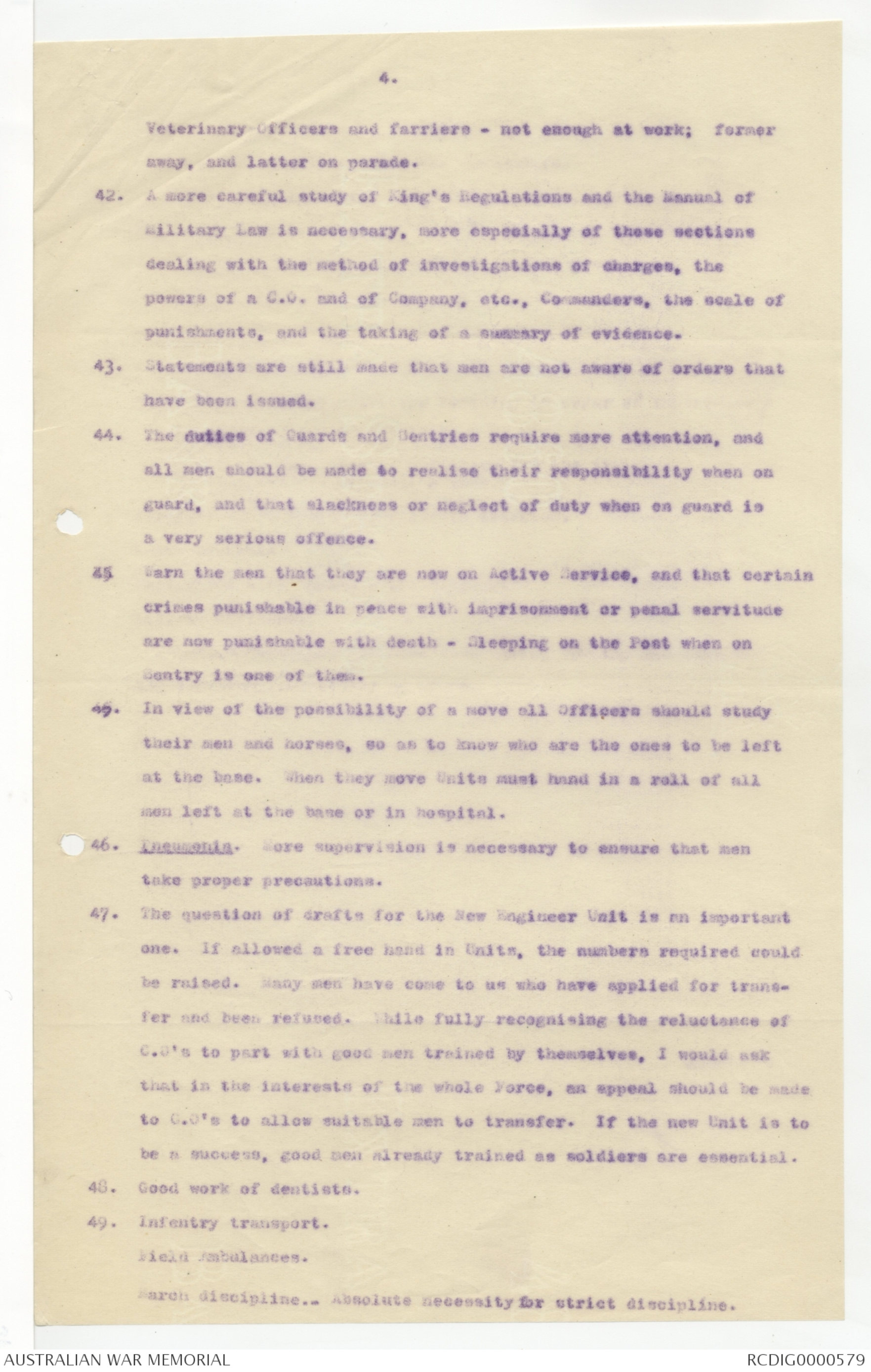
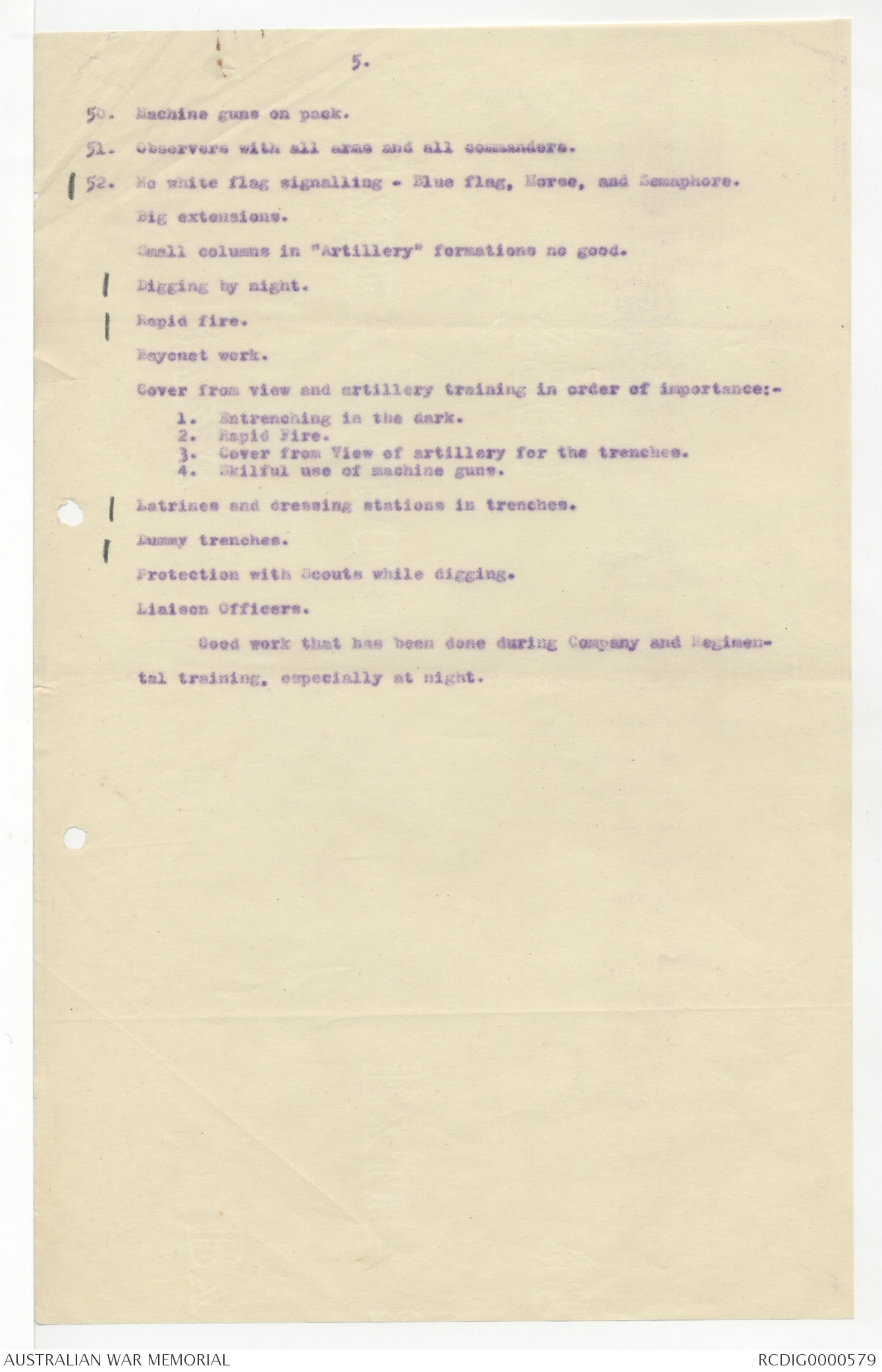
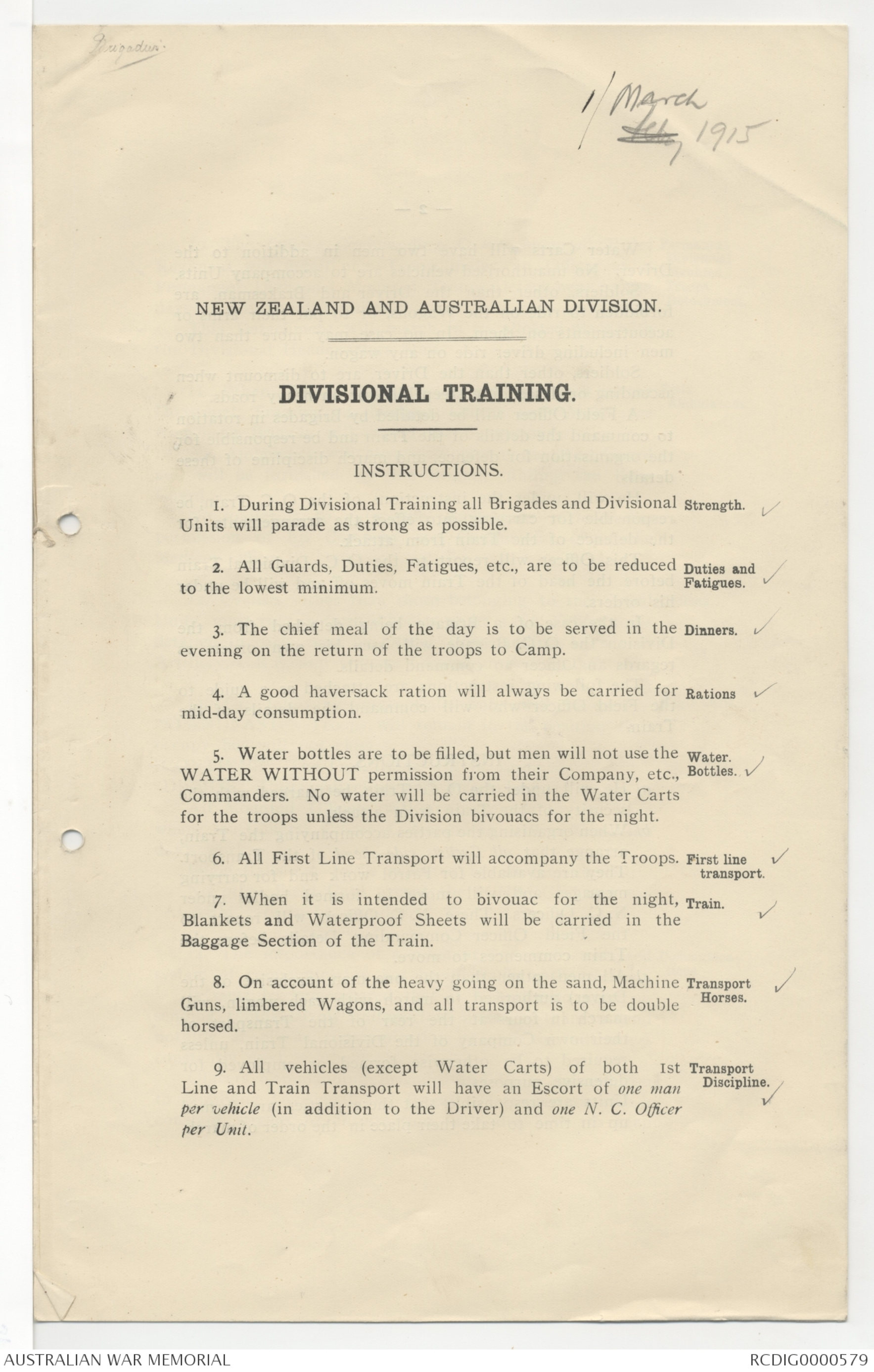
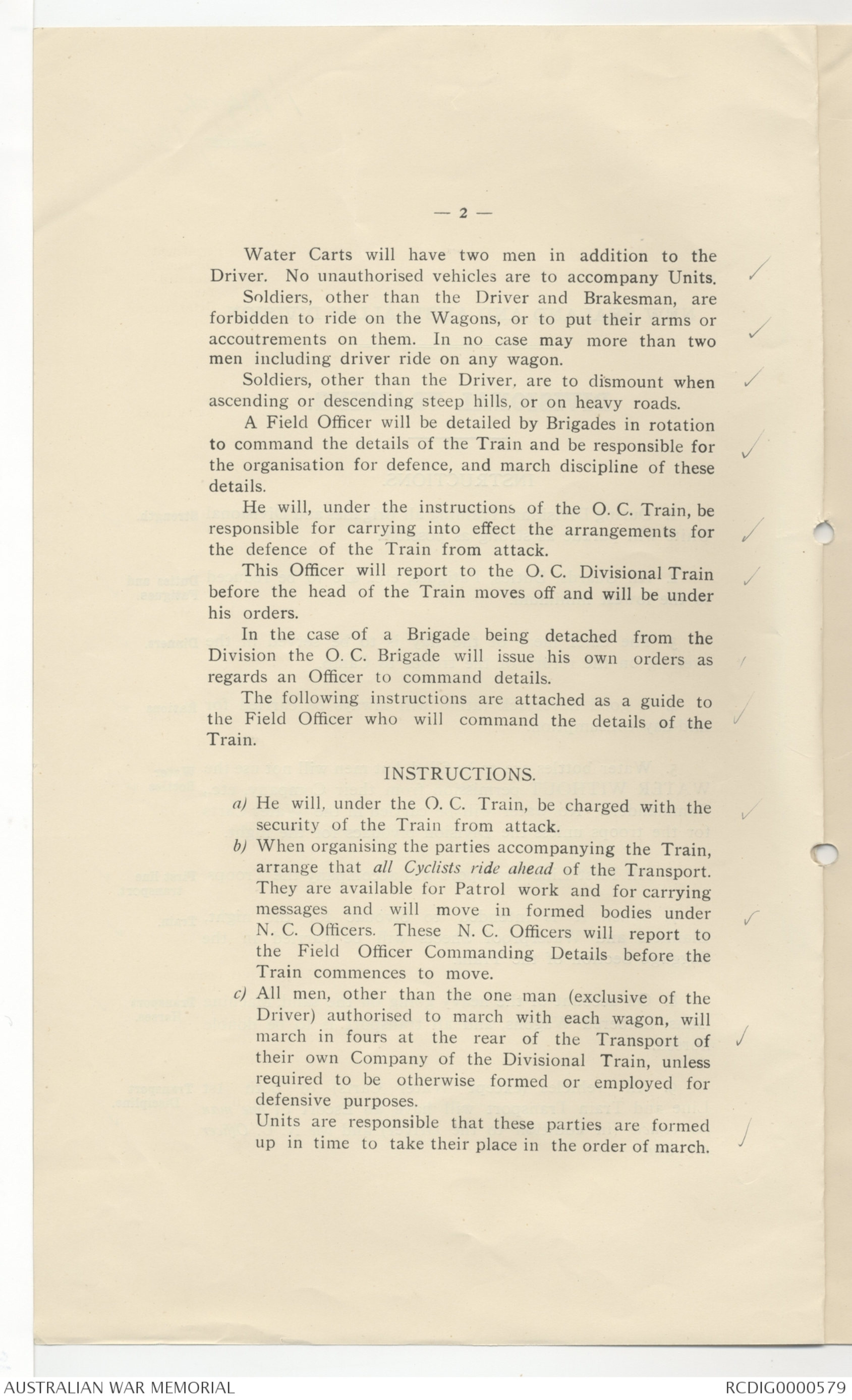
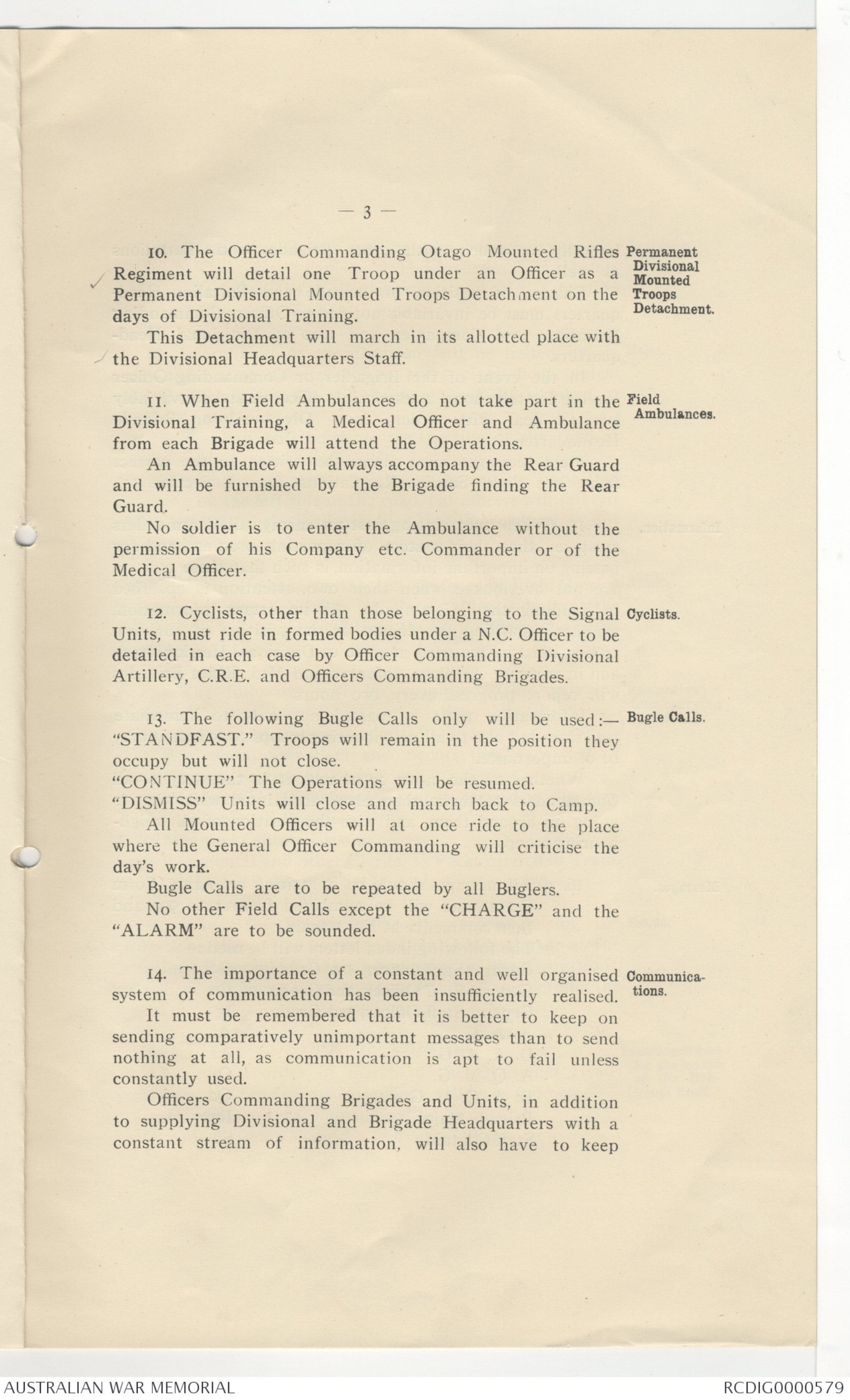
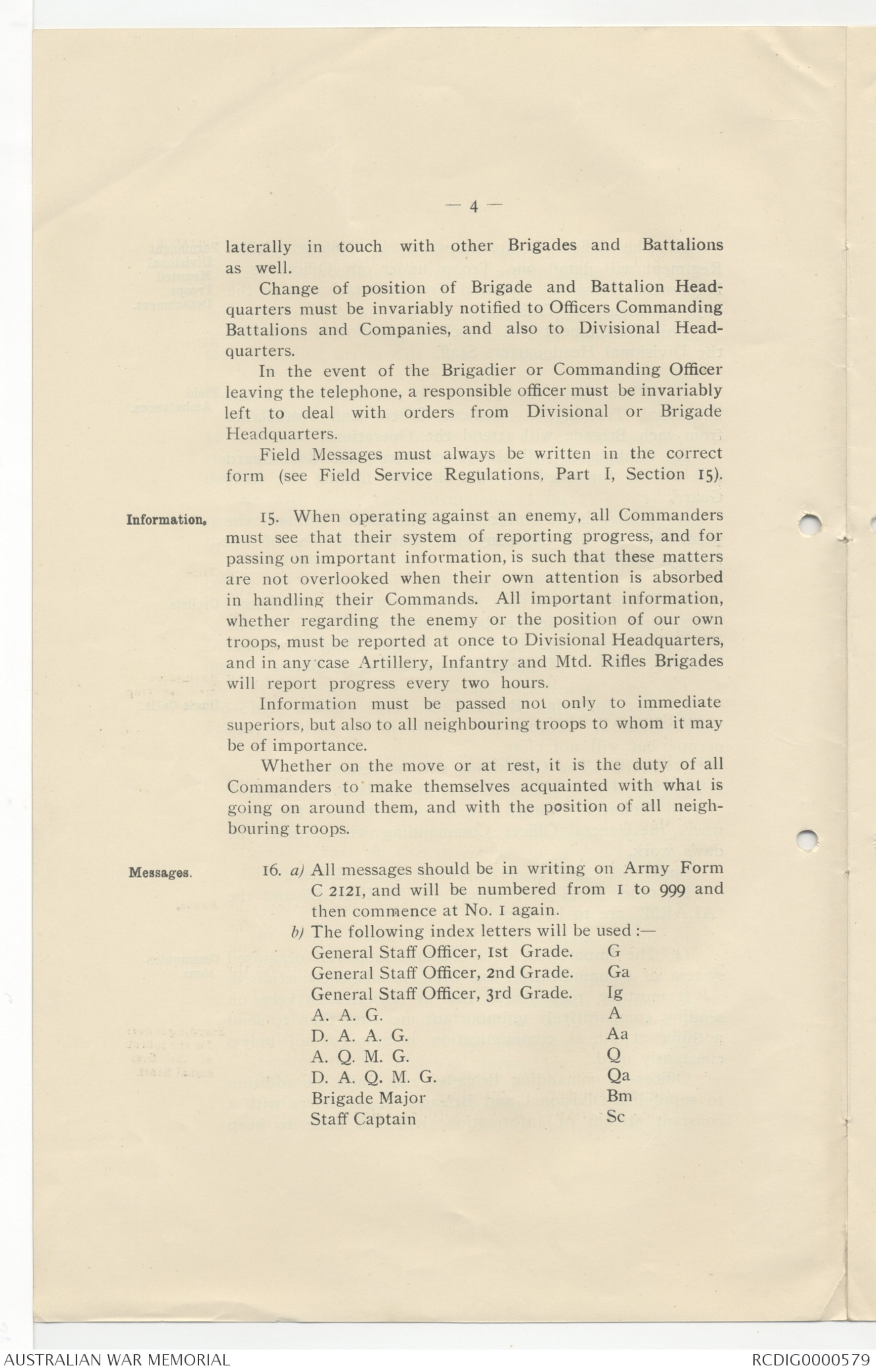
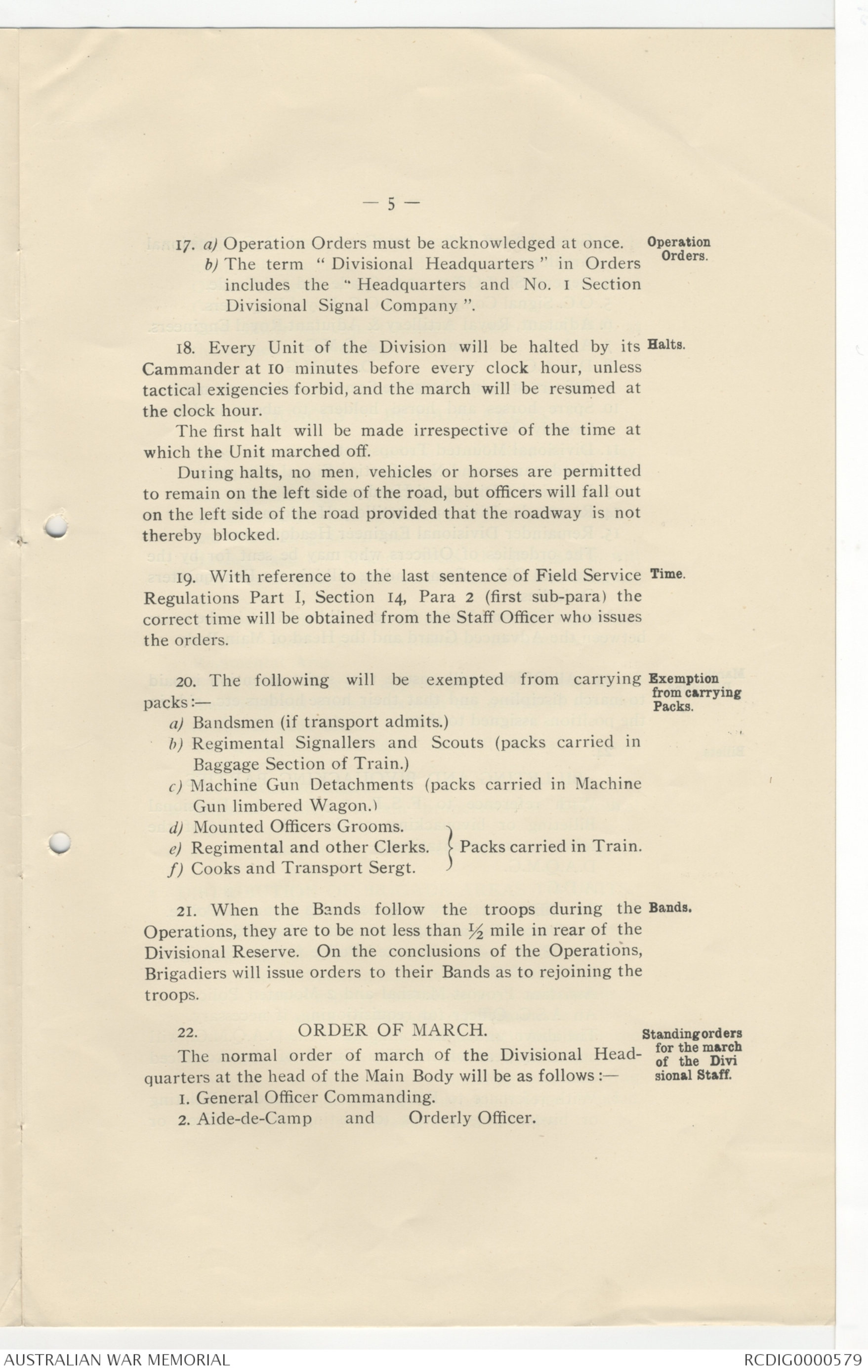
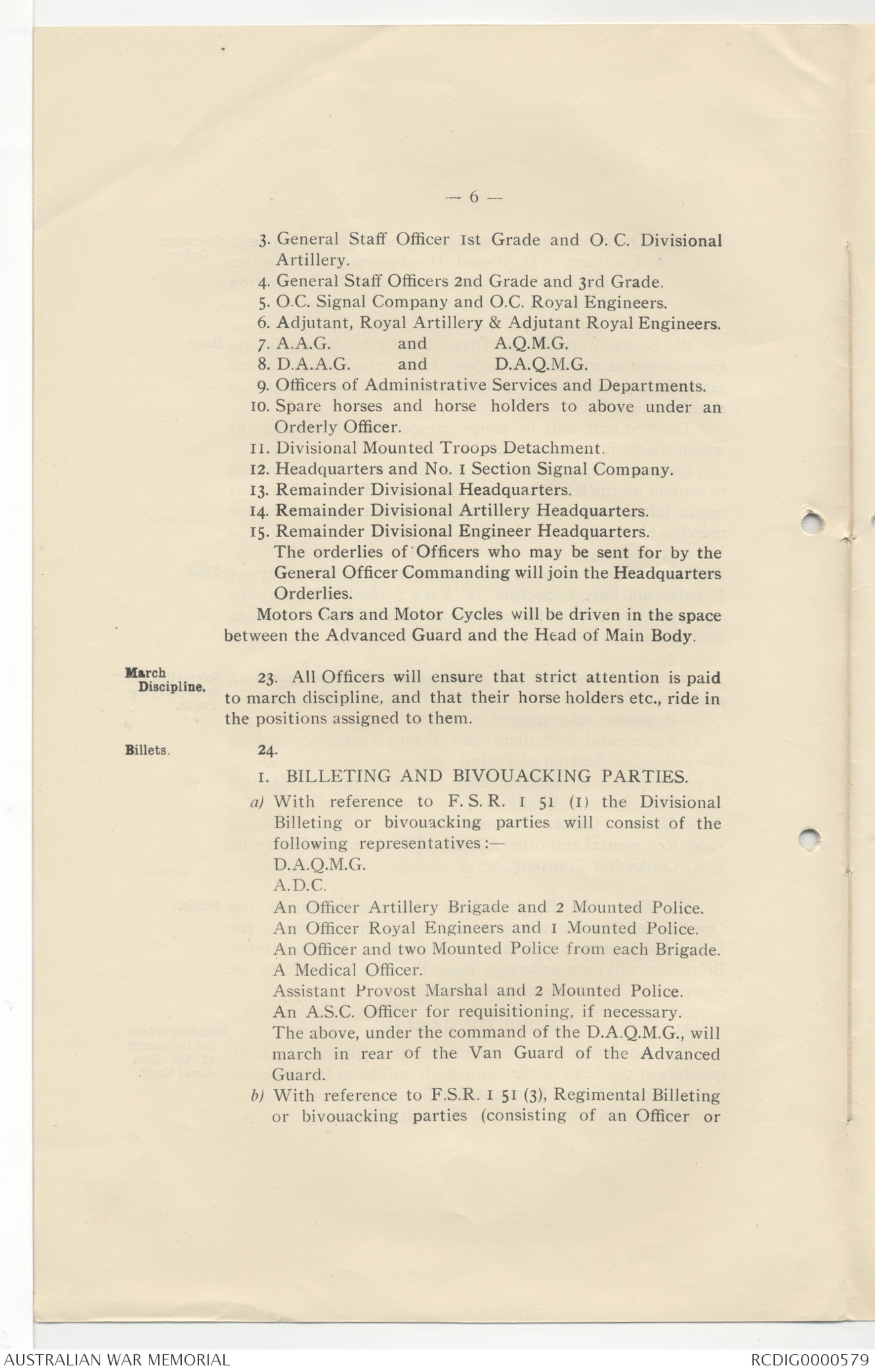
28/2/15
AUSTRALIAN & NEW ZEALAND ARMY CORPS HEADQUARTERS
S T A F F.
Lieut. General Sir W.R. Birdwood, K.C.S.I., Army Corps Commander
C.B., C.I.E., D.S.O.
Col. H. B. Walker, D.S.O. Senior G.S.O.
Lieut. Col. A. Skeen G.S.O., 1st. Grade
Major C. H. Villiers-Stuart " 2nd.Grade
Major C. M. Wagstaff " " "
" 3rd. " **
Bdn Gen Col. R. A. Carruthers, C.B. D.A. & Q.M.G.
Col. W. B. Lesslie A.A. & Q.M.G.
Major M. Hancock D.A.A. & Q.M.G.
Col. C. St. C. Cameron C.B. (Graded) A.A.G.
Col. C. S. Ryan V.D. S.M.0.
Capt. J. G. MacConaghy Camp Commandant
Lt–Col. A.C. de Joli de Lotbiniere Colonel R.E
Lt–Col. H.O. Knox A.Q.M.G
Col. C. Cunliffe Owen Brig–Genl. R.A.
Lt–Col. E.R. Bowler Assist. Prov. Marshal **
Capt. B.W. Onslow A.D.C. to Army Corps
Comdr.
Lieut.& Q.M. A.T. White Supt. Clerk
Lieut. G. Chirnside Automobile Corps
W.O. J.W. Donnelly Chief Clerk
| **Not yet officially appointed )
Note
Col. Hon. Surg. General W.D.C. Williams D.M.S. has an officer
at Shepheards Hotel but not on this staff.
A.J.
28-2-15
3.
28. Explain the system under which men and horses are already ear-
marked to join their own units, although not thoroughly trained –
they have not done any collective training. Devise a system
under which the newly arrived horses will not be mixed up with the
old horses, and so prevent them being overworked at the outset.
29. Officers and N. C. O's should stay in Camp in the evenings more
than they do, and help to entertain the men.
30. Horses are not to be raced. They are New Zealand Government
property, as they are fed and brought here at Government expense.
31. Units must now get into the way of dealing with the Base Record
Office.
32. Are the Regimental Signallers being trained up to concert pitch,
and is the equipment in good order?
33. The 8th Division are not allowing anyone to take a white handkerchief
to Europe, so everyone should provide themselves with
coloured handkerchiefs.
34.Sentries should challenge in an undertone, and the person
challenged should reply in an undertone.
35. Have squadron and Company Commanders got the few necessary books
and documents to take into the Field?
36. Indelible pencils, note books and carbon paper.
37. Each Platoon or troop must be kept contained within itself.
38. Emergency Rations must on no account be consumed without orders.
Where are they?
39. What we particularly practice are:–
1. Communications in the Field.
2. Medical Services in the Field.
3. Billeting.
40. Divisional Standing Orders will shortly be published.
4l. Over-riding and overdriving horses on the heavy sand.
Failing to dismount and rest horses as often as possible.
The feeding of horses.
Watering of horses after feeding.
Shoeing – spare set of cold shoes.
Saddling up in dark.
4.
Veterinary Officers and farriers – not enough at work; former
away, and latter on parade.
42. A more careful study of King's Regulations and the Manual of
Military Law is necessary, more especially of those sections
dealing with the method of investigation of charges, the
powers of a C.O. and of Company, etc., Commanders, the scale of
punishments, and the taking of a summary of evidence.
43. Statements are still made that men are not aware of orders that
have been issued.
44. The duties of Guards and Sentries require more attention, and
all men should be made to realise their responsibility when on
guard, and that slackness or neglect of duty when on guard is
a very serious offence.
45. Warn the men that they are now on Active Service, and that certain
crimes punishable in peace with imprisonment or penal servitude
are now punishable with death – Sleeping on the Post when on
Sentry is one of them.
45. In view of the possibility of a move all Officers should study
their men and horses, so as to know who are the ones to be left
at the base. When they move Units must hand in a roll of all
men left at the base or in hospital.
46. Pneumonia. More supervision is necessary to ensure that men
take proper precautions.
47. The question of drafts for the New Engineer Unit is an important
one. If allowed a free hand in Units, the numbers required could
be raised. Many men have come to us who have applied for transfer
and been refused. While fully recognising the reluctance of
C.O's to part with good men trained by themselves, I would ask
that in the interests of the whole Force, an appeal should be made
to C.O's to allow suitable men to transfer. If the new Unit is to
be a success, good men already trained as soldiers are essential.
48. Good work of dentists.
49. Infantry transport.
Field ambulances.
March discipline._ Absolute necessity for strict discipline.
5.
50. Machine guns on pack.
51. Observers with all arms and all commanders.
52. No white flag signalling – Blue flag, Morse, and Semaphore.
Big extensions.
Small columns in "Artillery" formations no good.
Digging by night.
Rapid fire.
Bayonet work.
Cover from view and artillery training in order of importance: –
1. Entrenching in the dark.
2. Rapid Fire.
3. Cover from View of artillery for the trenches.
4. Skilful use of machine guns.
Latrines and dressing stations in trenches.
Dummy trenches.
Protection with Scouts while digging.
Liaison Officers.
Good work that has been done during Company and Regimental
training, especially at night.
1/MarchFeb, 1915
NEW ZEALAND AND AUSTRALIAN DIVISION.
DIVISIONAL TRAINING.
INSTRUCTIONS.
1. During Divisional Training all Brigades and Divisional [*Strength.*]
Units will parade as strong as possible.
2. All Guards, Duties, Fatigues, etc. are to be reduced [*Duties*]
to the lowest minimum. [*and Fatigues.*]
3. The chief meal of the day is to be served in the [*Dinners*]
evening on the return of the troops to Camp.
4. A good haversack ration will always be carried for [*Rations*]
mid-day consumption.
5. Water bottles are to be filled, but men will not use the [*Water.*]
WATER WITHOUT permission from their Company, etc. [*Bottles.*]
Commanders. No water will be carried in the Water Carts
for the troops unless the Division bivouacs for the night.
6. All First Line Transport will accompany the Troops. [*First line*] [*transport.*]
7. When it is intended to bivouac for the night, [*Train*].
Blankets and Waterproof Sheets will be carried in the
Baggage Section of the Train.
8. On account of the heavy going on the sand, Machine [*Transport*]
Guns, limbered Wagons, and all transport is to be double [*Horses.*]
horsed.
9. All vehicles (except Water Carts) of both 1st [*Transport*]
Line and Train Transport will have an Escort of one man [*Discipline.*]
per vehicle (in addition to the Driver) and one N. C. Officer
per Unit.
— 2 —
Water Carts will have two men in addition to the
Driver. No unauthorised vehicles are to accompany Units.
Soldiers, other than the Driver and Brakesman, are
forbidden to ride on the Wagons, or to put their arms or
accoutrements on them. In no case may more than two
men including driver ride on any wagon.
Soldiers, other than the Driver, are to dismount when
ascending or descending steep hills, or on heavy roads.
A Field Officer will be detailed by Brigades in rotation
to command the details of the Train and be responsible for
the organisation for defence, and march discipline of these
details.
He will, under the instructions of the O. C. Train, be
responsible for carrying into effect the arrangements for
the defence of the Train from attack.
This Officer will report to the O. C. Divisional Train
before the head of the Train moves off and will be under
his orders.
In the case of a Brigade being detached from the
Division the O. C. Brigade will issue his own orders as
regards an Officer to command details.
The following instructions are attached as a guide to
the Field Officer who will command the details of the
Train.
INSTRUCTIONS.
a) He will, under the O. C. Train, be charged with the
security of the Train from attack.
b) When organising the parties accompanying the Train,
arrange that all Cyclists ride ahead of the Transport.
They are available for Patrol work and for carrying
messages and will move in formed bodies under
N. C. Officers. These N.C. Officers will report to
the Field Officer Commanding Details before the
Train commences to move.
c) All men, other than the one man (exclusive of the
Driver) authorised to march with each wagon, will
march in fours at the rear of the Transport of
their own Company of the Divisional Train, unless
required to be otherwise formed or employed for
defensive purposes.
Units are responsible that these parties are formed
up in time to take their place in the order of march.
— 3 —
10. The Officer Commanding Otago Mounted Rifles [*Permanent Divisional*]
Regiment will detail one Troop under an Officer as a {*Mounted*]
Permanent Divisional Mounted Troops Detachment on the [*Troops*]
days of Divisional Training. [*Detachment.*] This Detachment will march in its allotted place with
the Divisional Headquarters Staff.
11. When Field Ambulances do not take part in the [*Field*]
Divisional Training, a Medical Officer and Ambulance [*Ambulances.*]
from each Brigade will attend the Operations.
An Ambulance will always accompany the Rear Guard
and will be furnished by the Brigade finding the Rear
Guard.
No soldier is to enter the Ambulance without the
permission of his Company etc. Commander or of the
Medical Officer.
12. Cyclists, other than those belonging to the Signal [*Cyclists.*]
Units, must ride in formed bodies under a N.C. Officer to be
detailed in each case by Officer Commanding Divisional
Artillery, C.R.E. and Officers Commanding Brigades.
13. The following Bugle Calls only will be used : — [*Bugle Calls.*]
"STANDFAST." Troops will remain in the position they
occupy but will not close.
"CONTINUE" The Operations will be resumed.
"DISMISS" Units will close and march back to Camp.
All Mounted Officers will at once ride to the place
where the General Officer Commanding will criticise the
day's work.
Bugle Calls are to be repeated by all Buglers.
No other Field Calls except the "CHARGE" and the
"ALARM" are to be sounded.
14. The importance of a constant and well organised [*Communications.*]
system of communication has been insufficiently realised.
It must be remembered that it is better to keep on
sending comparatively unimportant messages than to send
nothing at all, as communication is apt to fail unless
constantly used.
Officers Commanding Brigades and Units, in addition
to supplying Divisional and Brigade Headquarters with a
constant stream of information, will also have to keep
— 4 —
laterally in touch with other Brigades and Battalions
as well.
Change of position of Brigade and Battalion Headquarters
must be invariably notified to Officers Commanding
Battalions and Companies, and also to Divisional Headquarters.
In the event of the Brigadier or Commanding Officer
leaving the telephone, a responsible officer must be invariably
left to deal with orders from Divisional or Brigade
Headquarters.
Field Messages must always be written in the correct
form (see Field Service Regulations, Part I, Section 15).
[*Information.*] 15. When operating against an enemy, all Commanders
must see that their system of reporting progress, and for
passing on important information, is such that these matters
are not overlooked when their own attention is absorbed
in handling their Commands. All important information,
whether regarding the enemy or the position of our own
troops, must be reported at once to Divisional Headquarters,
and in any case Artillery, Infantry and Mtd. Rifles Brigades
will report progress every two hours.
Information must be passed not only to immediate
superiors, but also to all neighbouring troops to whom it may
be of importance.
Whether on the move or at rest, it is the duty of all
Commanders to make themselves acquainted with what is
going on around them, and with the position of all neighbouring
troops.
[*Messages.*] 16. a) All messages should be in writing on Army Form
C 2121, and will be numbered from 1 to 999 and
then commence at No. 1 again.
b) The following index letters will be used :—
General Staff Officer, 1st Grade. G
General Staff Officer, 2nd Grade. Ga
General Staff Officer, 3rd Grade. Ig
A. A. G. A
D. A. A. G. Aa
A. Q. M. G. Q
D. A. Q. M. G. Qa
Brigade Major Bm
Staff Captain Sc
— 5 —
17. a) Operation Orders must be acknowledged at once. [*Operation Orders*]
b) The term " Divisional Headquarters " in Orders.
includes the " Headquarters and No. 1 Section
Divisional Signal Company ".
18. Every Unit of the Division will be halted by its [*Halts.*]
Commander at 10 minutes before every clock hour, unless
tactical exigencies forbid, and the march will be resumed at
the clock hour.
The first halt will be made irrespective of the time at
which the Unit marched off.
During halts, no men, vehicles or horses are permitted
to remain on the left side of the road, but officers will fall out
on the left side of the road provided that the roadway is not
thereby blocked.
19. With reference to the last sentence of Field Service [*Time.*]
Regulations Part 1 Section 14, Para 2 (first sub-para) the
correct time will be obtained from the Staff Officer who issues
the orders.
20. The following will be exempted from carrying [*Exemption from carrying*]
packs :— [*Packs.*] a) Bandsmen (if transport admits.)
b) Regimental Signallers and Scouts (packs carried in
Baggage Section of Train.)
c) Machine Gun Detachments (packs carried in Machine
Gun limbered Wagon.)
d) Mounted Officers Grooms. }
e) Regimental and other Clerks. } Packs carried in Train.
f) Cooks and Transport Sergt. }
21. When the Bands follow, the troops during the [*Bands.*]
Operations, they are to be not less than ½ mile in rear of the
Divisional Reserve. On the conclusions of the Operations,
Brigadiers will issue orders to their Bands as to rejoining the
troops.
22. ORDER OF MARCH. [*Standing orders*]
The normal order of march of the Divisional Head [*for the march*]
quarters at the head of the Main Body will be as follows :— [of the Divi
1. General Officer Commanding. [sional Staff.*]
2. Aide-de-Camp and Orderly Officer.
— 6 —
3. General Staff Officer Ist Grade and O.C. Divisional
Artillery.
4. General Staff Officers 2nd Grade and 3rd Grade.
5. O.C. Signal Company and O.C. Royal Engineers.
6. Adjutant, Royal Artillery & Adjutant Royal Engineers.
7. A.A.G. and A.Q.M.G.
8. D.A.A.G. and D.A.Q.M.G.
9. Officers of Administrative Services and Departments.
10. Spare horses and horse holders to above under an
Orderly Officer.
11. Divisional Mounted Troops Detachment.
12. Headquarters and No. 1 Section Signal Company.
13. Remainder Divisional Headquarters.
14. Remainder Divisional Artillery Headquarters.
15. Remainder Divisional Engineer Headquarters.
The orderlies of Officers who may be sent for by the
General Officer Commanding will join the Headquarters
Orderlies.
Motors Cars and Motor Cycles will be driven in the space
between the Advanced Guard and the Head of Main Body.
[*March Discipline*] 23. All Officers will ensure that strict attention is paid
to march discipline, and that their horse holders etc., ride in
the positions assigned to them.
[*Billets.*] 24.
1. BILLETING AND BIVOUACKING PARTIES.
a) With reference to F.S.R. I 51 (I) the Divisional
Billeting or bivouacking parties will consist of the
following representatives :—
D.A.Q.M.G.
A.D.C.
An Officer Artillery Brigade and 2 Mounted Police.
An Officer Royal Engineers and 1 Mounted Police.
An Officer and two Mounted Police from each Brigade.
A Medical Officer.
Assistant Provost Marshal and 2 Mounted Police.
An A.S.C. Officer for requisitioning, if necessary.
The above, under the command of the D.A.Q.M.G., will
march in rear of the Van Guard of the Advanced
Guard.
b) With reference to F.S.R. I 5I (3), Regimental Billeting
or bivouacking parties (consisting of an Officer or
 Jacqueline Kennedy
Jacqueline KennedyThis transcription item is now locked to you for editing. To release the lock either Save your changes or Cancel.
This lock will be automatically released after 60 minutes of inactivity.